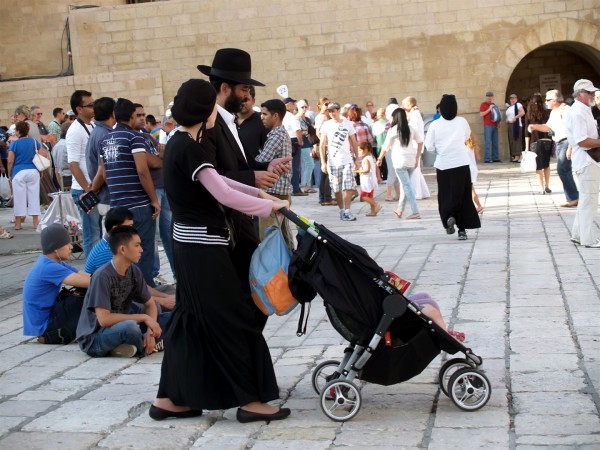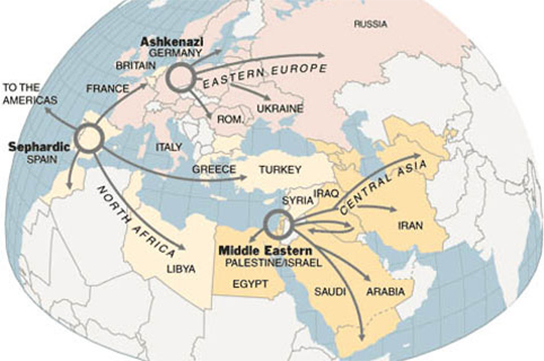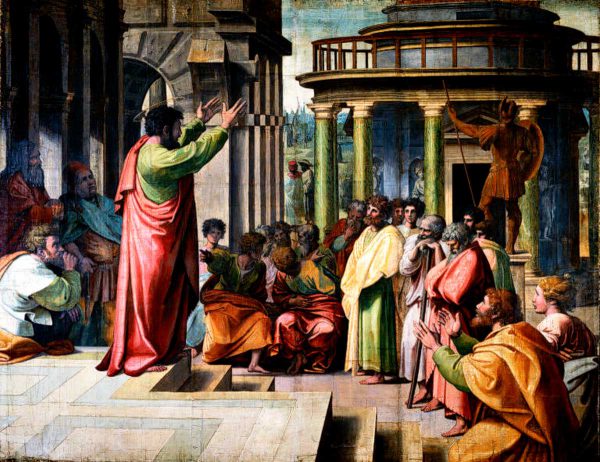 Judean countryside at Mount Hebron.
Judean countryside at Mount Hebron.
“Then all the Jews returned from all the places to which they had been driven away and came to the land of Judah.” (Jeremiah 40:12)
Have you ever wondered if you were Jewish?
Many Gentile Christians think that they are descendants of Israel or spiritual Jews because they have a love for the God of Israel.
At the same time, many “Jewish people” question their identify as Jews because only their father is Jewish and not their mother.
According to Judaism, you are Jewish if your mother is Jewish.
However, in the Bible, being “Jewish” was passed down through the father, just as it is recorded from Abraham to Isaac to Jacob. It is also recorded in the genealogies of the kings, the prophets, and Yeshua (Jesus) Himself.
So who really is a Jew?

An Orthodox Jewish father and mother in Jerusalem.
The answer is important for Jewish People today, since it determines which Jewish synagogue or Jewish denomination one can belong to.
And, in order to immigrate to Israel under the nation’s “Law of Return,” the law states that “for the purposes of this Law, ‘Jew’ means a person who was born of a Jewish mother or has converted to Judaism, and who is not a member of another religion.”
Over the millennia for Jews living outside of Israel, answering the questions of “who is a Jew?” has determined who gets evicted from their national homeland; who gets socially, financially, and politically persecuted; and who gets killed in pogroms and death camps.
So, what and who is a Jew is and what does that mean for the Believer in Yeshua (Jesus) today?
The lion of the tribe of Judah is displayed on Jerusalem’s municipal flag.
What Is a Jew?
In Hebrew, the word for Jew is Ye-hu-di, יְהוּדי.
The name is derived from the tribe of Judah (Yehudah), but being a Jew is not limited to the people of this tribe.
Generally, anyone who lived in the southern Kingdom of Judah, including the tribes of Benjamin and Levi as well as those fleeing the Assyrian invasions of Israel to the north assimilated into the Kingdom of Judah (also known as Judea).
As well, people from the Tribes of Ephraim and Manasseh were captured by the Judean King Asa in the 8th century BC and brought to Judea.
Many of them were taken captive to Babylon in the 7th century BC.
The captives in Babylon who returned to the Kingdom of Judea in the 6th century BC included a mix of people from the tribes of Judah, Benjamin, Levi, Ephraim, and Manasseh as well as people from the other Israelite tribes and some foreigners who had been exiled to Babylon.

Map of the split kingdom: Judah to the south and Israel to the north (after the northern tribes refused to accept Solomon’s son as their king).
Because the Kingdom of Israel to the north was never restored after the Assyrian invasion, Judea became a melting pot of sorts for any “Children of Israel” wishing to return to a portion of God’s Promised Land.
Those who made their home in Judea, from whatever tribe they were from, were called Jews.
We see this in Esther 2:5 where Mordecai is called a Jew even though he is from the tribe of Benjamin and not Judah:
“Now there was a Jew in the citadel of Susa whose name was Mordecai son of Jair son of Shimei son of Kish, a Benjaminite.”

Bethlehem is part of Judea. Today, a large part of Judea is known as the “West Bank,” which is occupied by the Palestinians who are seeking to make Judea part of their permanent Palestinian state.
Who Is a Jew?
A Jew is someone who can trace their lineage to Abraham through Isaac and Jacob. However, there has been no purebred Jewish person for many millennia.
In fact, many of Jacob’s sons, the fathers of the twelve tribes of Israel, married Canaanite women, such as Judah (Genesis 38:2).
And after 430 years in Egypt, mixed crowds crossed the Red Sea with the descendants of Jacob.
“The Israelites [descendants of Jacob] journeyed from Rameses to Succoth, about six hundred thousand men on foot, besides children. A mixed crowd also went up with them, and livestock in great numbers, both flocks and herds.” (Exodus 12:37-38)
With so much mixing going on, every sect of Judaism today as well as the State of Israel has its own qualification for who can be considered a Jew and be a part of their community.

Orthodox Jewish boys and men in the Mea Shearim neighborhood of Israel.
In the Bible, to be qualified as a priest, Israeli king, or prove tribal affiliation, the lineage of a Jewish person was traced through the line of the father.
We see this in the genealogy passages in Genesis, Numbers and Chronicles, which show that all the names follow the father.
In the Gospels, Matthew chapter 1 traces the lineage of Yeshua from Abraham through the male line of Joseph, the husband of Mary.
However, in every Jewish community today except the Karaites, being Jewish is traced through the mother.
This decision to shift Jewish identity from the line of the father to the mother could have happened to address the high rate of intermarriage and rape by foreign men among Jewish women.
So who is a Jew today? It depends on who you ask!
The chart below shows how complicated that answer can be:

As shown on the chart above, Messianic Jews (Jews who believe in Yeshua/Jesus) are not considered Jewish in mainstream Judaism.
Some Rabbis say that if you are born a Jew, you will die a Jew; a Messianic Jew, although an idolater in their eyes, is still — a Jew. But the Jewish community, for the most part, rejects Messianic Jews as Jewish.
Messianic Jews, for instance, are generally not allowed to be buried in Jewish cemeteries.
And, on December 25, 1989, Israel’s Supreme Court passed a law that a Jewish person who believes in Yeshua is not considered a Jew under the Law or Return.
This makes Messianic Jews ineligible to become citizens of Israel under that law.

Am I Jewish?
In recent years, many Gentile Believers (Christians) have taken DNA tests, hoping to find some “Jewish DNA” in their blood.
In fact, a specific genetic marker known as the Cohen Modal Haplotype (CMH) has been identified among men with ancestry dating back to Aaron, the first High Priest.
But even that DNA marker is not enough today to qualify as a priest-in-training for the Third Temple at the The Nezer HaKodesh Institute for Kohanic Studies, established by the Temple Institute in Jerusalem.
Other religious factors are considered, such as whether or not the candidate has followed the priestly purity laws.
For instance, anyone who has made contact with a dead body or has come under the roof of a dead person is disqualified.
Therefore, a Jew of Cohen (Priestly) descent who was born in a hospital, has visited hospitals, or has been to a cemetery (except for a close relative) is not eligible to be a part of this “priest-in-training” program.

The Nezer HaKodesh Institute for Kohanic Studies trains priests to perform offerings and sacrifices as prescribed in the Torah (first five books of the Bible) (Source: Temple Institute YouTube capture)
You might not carry the CMH marker, but what about markers for the more common Ashkenazi (European), Sephardic (Spanish), and Mizrachi (Middle Eastern) Jews?
Generally speaking, genetic markers can help people trace their ancestry to certain groups of Jewish communities in certain geographical locations who share DNA markers that point to a Middle East origin.
So, no definitive test can say, “I am Jewish,” but DNA correlations can be made among groups who have historically identified themselves as Jewish, such as the Ashkenazi Jews of Europe.

Map showing the migration of Ashkenazi, Sephardic, and Middle Eastern Jews into the nations.
Should a Gentile Believer (Christian) Convert to Judaism?
Today, if a non-Jewish woman formally converts to traditional Judaism, she is considered to be a full Jew and her children will be Jewish.
Some Gentile Believers in Yeshua also desire to become recipients of the covenant God made at Sinai with the Israelites. Others want to become Israeli citizens, and they think that they need to convert to Judaism to do so.
But to officially convert to the Jewish religion, Jewish Rabbis and the State of Israel will expect a Christian to deny their faith in Yeshua.
This issue of whether Gentiles should convert to Judaism was settled In the first century. Peter and Paul, who were two of the first Jewish apostles to the Gentiles, never required formal conversion to a system of Judaism.
Paul wrote to the Gentiles in Galatia (modern Turkey):
“In Messiah Yeshua, neither circumcision nor uncircumcision has any value. The only thing that counts is faith expressing itself through love.” (Galatians 5:6)

Paul Preaching in Athens (1515), by Raphael.
Not every Jewish Believer at the time agreed with this view, however.
At the Jerusalem Council in Acts 15, “some of the Jewish believers in Yeshua who were raised as Pharisees [Orthodox Jews] stood up and said, ‘The Gentiles must be circumcised and required to keep the law of Moses.’” (verse 5)
But Peter reminded them that God had long ago decided to share the Gospel with Gentiles around the world so they would believe (Isaiah 49:6 and Amos 9:11-12).
The Gentiles in Antioch (Turkey) who believed the Gospel message received the Holy Spirit, just as the first Jewish apostles did on Pentecost (Shavuot).
“God, who knows the heart, showed that He accepted them by giving the Holy Spirit to them, just as He did to us. He did not discriminate between us and them, for He purified their hearts by faith,” Peter said.
Speaking to the Pharisee Believers, Peter continued: “Now then, why do you try to test God by putting on the necks of Gentiles (non-Jews) a yoke that neither we nor our ancestors have been able to bear?
“No! We believe it is through the grace of our Lord Jesus that we are saved, just as they are.” (Acts 15:6–11)

Pilgrims visit the Garden Tomb in Israel where Yeshua may have been buried.
The half brother of Yeshua, James, then declared: “It is my judgment, therefore, that we should not make it difficult for the Gentiles (non-Jews) who are turning to God. Instead they should abstain from food polluted by idols, from sexual immorality, from the meat of strangled animals and from blood.” (verses 19–20)
This was the decision at the Jerusalem Council: the Gentiles (non-Jews) were not supposed to convert to Judaism, but to know their identity in God.
And Paul says in a spiritual meaning (not physical) that there is neither Jew nor Gentile in Messiah. (Galatians 3:28)
So, today, as both Jewish and Gentile Believers, we have a responsibility to tell the Jewish People who are the Lost Sheep of Israel seeking their True Shepherd, that their true identity is found in Messiah Yeshua, the One who has made eternal salvation available to them.
“For the Son of Man came to seek and to save the lost.” (Luke 19:10)





